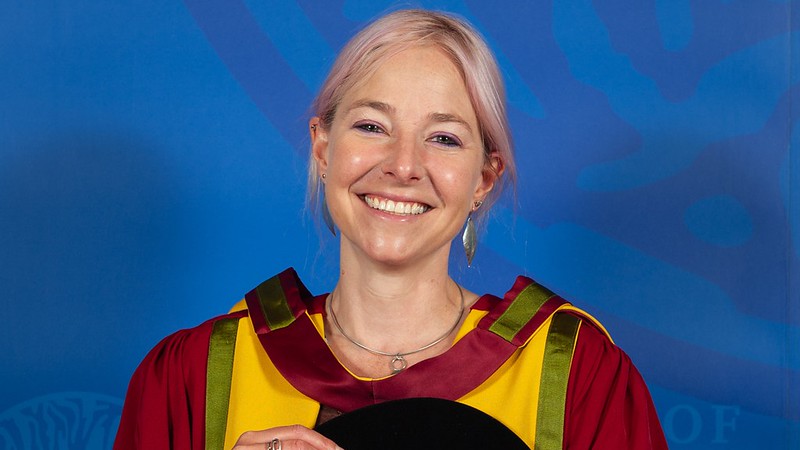Vice-Chancellor, it is my pleasant, albeit somewhat superfluous, task to introduce the very person in our congregation today least in need of an introduction, Professor Alice Roberts: anatomist, anthropologist, palaeopathologist, author and science communicator.
Having originally studied and practiced medicine in Cardiff, Alice subsequently became a lecturer in anatomy at the University of Bristol. Within Bristol’s Centre for Comparative and Clinical Anatomy, she taught clinical anatomy and physical anthropology, while at the same time researching for a PhD in paleopathology – the study of disease in ancient human remains - which she was awarded in 2008. From 2009 to 2016 Alice was Director of Anatomy at the NHS Severn Deanery School of Surgery, running a postgraduate course in surgical anatomy.
It is, of course, for her writing and presenting that Professor Roberts is best known to most of us. A passionate advocate of rationalism and the public understanding of science, her scientific and historical programs from recent years include The Origins of Us, Ice Age Giants, The Day the Dinosaurs Died, The Celts, Britain’s most Historic Towns, and Digging for Britain - now in its tenth year. In 2018, she presented the Royal Institution Christmas Lectures on the theme of “Who Am I”. The Royal Society’s own webpages list her television debut as Channel 4s Time Team in 2001. However, much more tellingly and significantly, she had in fact featured on the front cover of the Radio Times no less than 13 years earlier as winner of the Blue Peter young artist of the year competition. Through her anatomical and embryological artwork and writing on human evolution and development, she now particularly promotes the reciprocal illumination of art and science, as well as drawing as a vitally important teaching tool.
Ten years ago, Alice became the University of Birmingham’s first Professor of Public Engagement in Science, and it is for her work in this sphere, as well as for her scientific research, that we particularly honour her today.
The events of the last three years have underscored the value of scientific research for public health and wellbeing, but equally the vital importance of scientific literacy for all of us. Our understanding of the pandemic has necessarily been an evolutionary one. Viruses mutate and evolve, and the more of us who carry them, the faster and more frequently new and potentially more dangerous variants arise. Professor Roberts has done immeasurable public service by lending her support to Independent SAGE and other panels of experts advising caution in our emergence from the pandemic. She urges a rational approach, because – as she has said in other contexts – “at the end of the day science is about evidence, not wishful thinking”. For her scientific rigor and unswerving dedication to the pursuit of truth, she is also – if my colleagues are anything to go by – universally popular amongst scientists and other academics. Indeed, many of those same colleagues expressed their hope that Professor Roberts has a long hallway or suitably well-appointed bathroom, as in honouring her today we are in the excellent company of Leeds, Sussex, Royal Holloway, the OU, Bournemouth and Cardiff.
In Bath, we have been hugely fortunate to receive Professor Roberts’ support on the Advisory Board of our Milner Centre for Evolution. As well as being a centre for research, we seek to promote the public understanding of evolution and to determine the best ways in which to teach it. Alice’s own work promoting the teaching of evolution in schools was recognised in the award of Humanist of the Year in 2015, an organisation of which she is now president. It is therefore difficult to imagine anyone better placed to support us in our own efforts. Vice-Chancellor, for this, and for her patronage of science festivals and charities within the southwest and nationally, I present Professor Alice Roberts, who is eminently worthy to receive the Degree of Doctor of Education honoris causa.

